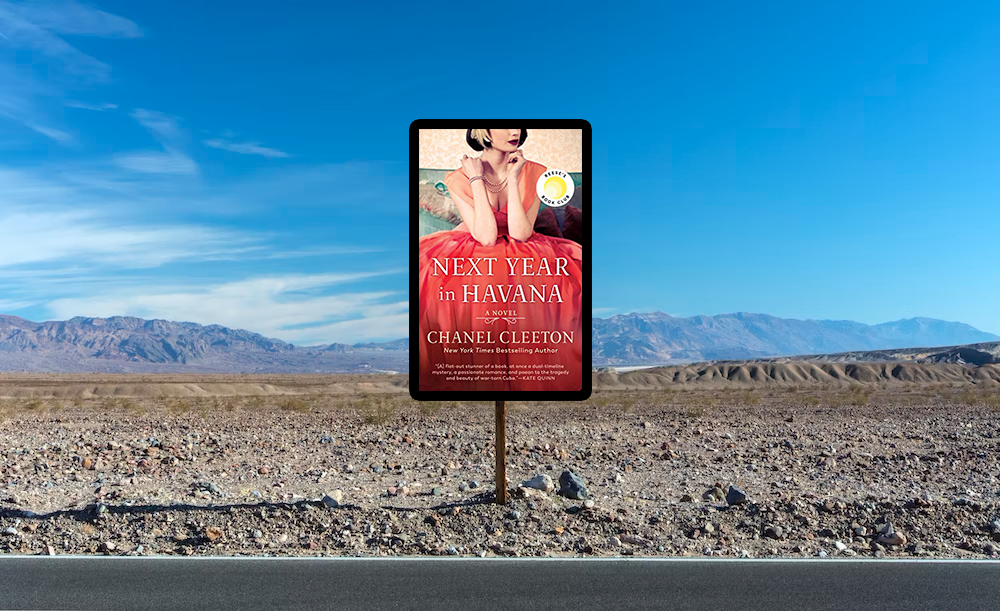I’ve always been a bookworm (this is actually something I shared with my grandfather, who along with Abuela Rosa, funded my intense addiction to books even as a child) so earlier this year when I came across Chanel Cleeton’s book, Next Year in Havana, about the lives of two Cuban women from the same family facing challenges and changes in uncertain times, I knew I had to read it.
Chanel Cleeton is a Miami-born Cuban author who grew up hearing stories of her family’s exodus from Cuba following the Cuban revolution — and Next Year in Havana is loosely based on these stories. The book (which was featured in Reese Witherspoon’s book club) tells the stories of Elisa Pérez in 1958, right as Fidel Castro took over the Cuban government, and Marisol Ferrara, Elisa’s granddaughter, in 2017, who goes back to Havana to fulfill her grandmother’s last wish: to go back home.
Every year, we toast to hopefully getting to celebrate back home again in a ‘rebuilt Jerusalem.’ This toast is nearly identical to a toast referenced in the book (and the one that the book is named after): next year in Havana.
Ces Heredia
In 1958, Elisa Pérez and her sisters are the daughters of a wealthy sugar baron, living in an affluent area of Havana. For fun, they sneak out of their privileged neighborhood to attend parties that their very conservative mother would never approve of. It is at one of these parties that Elisa meets a young revolutionary, Pablo, with whom she beings a secret love affair.
In 2017, Marisol Ferrara is a freelance journalist stuck between trying to be faithful to her family’s business/legacy and being true to herself — a feeling I personally know all too well, it’s not an easy spot to be in. She grew up hearing a romanticized version of her grandmother Elisa’s story, before and after fleeing Cuba. Inspired by these tales and following her grandmother’s dying wish of returning home, Marisol travels to Cuba hoping to find the pieces of her and her family’s past that are missing in her present. Much like her grandmother did all those years before her, she too finds love in the unlikeliest of places.
The book follows both women as they try to navigate life, love, and family relationships in uncertain times. For Elisa, it’s revolution in her native Cuba. For Marisol, it’s figuring out how to reconcile the Cuba of her grandmother’s stories with the actual political and social situation the island face. And that’s before grappling with all how all of that plays a part in her own story as the descendant of an exiled Cuban.
Part of what made Next Year in Havana so captivating is its explanation of the history and politics surrounding the events of both timelines. On the one hand, we get bits and pieces of what it was like to be one of the lucky few who found themselves in the good graces of President Fulgencio Batista, and how dangerous that became from one day to the next once Fidel Castro’s revolution took over the government. On the other, we get glimpses of what Cuba is like in a post-Castro world and how only those in Castro’s (Raúl Castro, that is) good graces truly enjoy privilege, wealth, and protection there.
I firmly believe in signs and ‘Next Year in Havana’ was a huge, 300+ page sign that made me feel like eventually, all would be well.
Ces Heredia
While I admit I had a bit of trouble getting into the book at first (I fully blame my ADHD for this — I can´t concentrate on reading for long periods of time as much as I could when I was younger) once I got going, I simply couldn’t put it down. It wasn’t just how captivating the story was, but also the little signs and things that I deeply connected with. At first, it was Marisol’s relationship with her abuela Elisa which reminded me of my own relationship with my two grandmothers. Then it was the parallels between Marisol feeling torn between accepting a lucrative offer to join the family business and following her heart and sticking with writing. It was reading the book and feeling a deep connection to Elisa’s fear for her country when the man who presented himself as a “savior” ended up becoming the type of “leader” he had so vehemently criticized. It was finding a story about an exodus and exile, leaving one’s homeland and yearning for it years later right as I began celebrating Passover — for context, Passover is the Jewish holiday in which we remember the Jewish people’s exit from Egypt. Every year we toast to hopefully getting to celebrate back home again in a “rebuilt Jerusalem.” This toast is nearly identical to a toast referenced in the book (and the one that the book is named after): next year in Havana.
I firmly believe in signs and Next Year in Havana was a huge, 300+ page sign that made me feel like eventually, all would be well; it felt like the world telling me I’m on the right path despite all the mistakes I’ve made. The more I read, the less alone and scared I felt. If you, like me, believe in signs, let this be your sign to add Chanel Cleeton’s Next Year in Havana (and the rest of her books following the Pérez women — yes, there are more!) to your reading list. I promise you won’t regret it.

